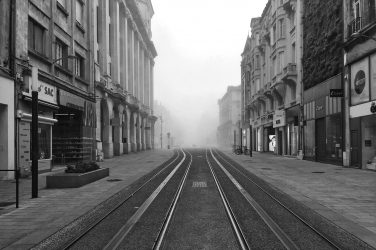With every immigrant, wherever in the world, there is a long back-story. In fact, we all have our own adventures, misfortunes and particular backgrounds, but people who for some reason have moved to another country are the ones that peak my curiosity. Regardless of the conditions and for which reason they left their original piece of land, these people have all been through processes of adaptation in a setting other than their natural one. The following questions revolve around my head: how do they feel about their belonging or non-belonging condition? And who do they feel they are?

It has always been very tempting to wonder in silence about the story of an unknown foreigner on the street and, more than that, to guess if somehow there is a connection, even a very distant and irrelevant one, between his life and mine. Fortunately, some films come to life to soothe my fertile and endless imagination. Like a dream that allows overlooking the other side of our lives, the Edge of Heaven linked some dots in my mind and confirmed: I am not the only one with these musings.
Identity seekers
Identity and the feeling of belonging, wrote Zygmunt Baumann, do not have the solidity of a rock. In fact, they are negotiable and a never-ending, unfinished activity in which we all are engaged throughout life. Of the new generation of European film makers, few seem to be as talented as Fatih Akin in the art of portraying the frantic search for identification with a place, a culture and a nation in a puzzling globalised world. It is true that his filmography has become known for having as backdrop the second generation of Turkish immigrants in Germany but, in a broad perspective, his plots could be easily adapted to reflect the same kind of relationship between Algerians in France, Nigerians in the UK or Surinamese in the Netherlands, to name a few of the various identity intersection examples in Europe.

Although released in 2007, I believe that the film The Edge of Heaven (Auf der anderen Seite, in the original German title) has never been so sharply suitable for the post-Charlie Hebdo world that we now live in. In the aftermath of the incident in Paris, a bloodcurdling amount of interpretations – especially by journalists, politicians and ordinary people – pointed out to a dangerous, myopic perception that highlights moral and cultural boundaries between one people and other. It made me wonder whether Samuel Huntington’s Clash of Civilizations had been finally proved right. Would it be true then that the “identity circles” of the 2nd and 3rd generation of immigrants and the European have natural conflicting limitations? And to what extent is co-existence solid concept in this divisive framing of cultures?
Some answers to these thoughts came by surprise, after watching a film that pokes the audience by precisely suggesting the fragility of this idea. The geniality of Akin’s Edge of Heaven is to sew a narrative that assembles loose pieces of individuals in the quest for identification-building into one big puzzle, whereby everyone – Europeans and its multiple generations of immigrants – is somehow intimately connected and dependent on each other, yet they do not acknowledge how close they are.
Closer than it looks
On one universe, Nejat, a second-generation Turk who has a successful academic career in Germany. His life is impacted by his relationship with his old father, who also lives in Germany and gets involved with a Turkish prostitute with a troublesome past, Yeter. Offering the spectator – but not the characters – the chance to explore another façade of a major coincidence, the centre of the plot shifts to explore Yeter’s fugitive daughter Ayten and her relationship with a young German, Lotte, whose mother completes the complex set of characters and the metaphors they represent.

If Akin is right, it is not a matter of willingness to interact with the other. Europe and its relationship with neighbours and minorities has become one that leaves no room, in practical terms, for segregation. He is not concerned with moral judgments or to the promotion of multiculturalism as a policy, but to the pragmatic extent of our days. It seems that right-wing parties, street-level nationalists and a huge number of anti-immigration activists have not realised this little detail yet, but xenophobia in Europe is, besides being despicable of course, a naïve discourse. Akin’s film is a masterpiece by subtly suggesting that chauvinistic opinions are silly, to say the least. Unless one lives in a lonely island, the message here is that everybody is on the same boat. Even though people might not agree on where to sail to and are not sure whether it will float or sink, there remains just one boat.
The Edge of Heaven addresses the search for identity in a blurred new century and, above all, suggests lessons to be learned. From the micro to the macro perspective, characters’ personal dramas spill all over the place and their comfort bubbles are burst, revealing the fragile, almost invisible, core of the whole question. Among such a complex wide of relationships, critiques on bureaucracy and institutions, encounters and mismatches, a scene of a coffin that goes and a coffin that comes set the bottom line of the film: regardless of nation-states, citizenships, beliefs and actions, the human condition is the same for all. If only films like these had the outreach of Hollywood blockbusters.
Cover photo: Dominic Sayers (Flickr); Licence: CC BY 2.0










